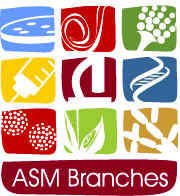Conference Speakers
ASM Foundation Speaker Dr. Diana E. Northup, Professor:
General Library - Science & Engineering, Associate Professor of Biology, University of
New Mexico. Dr. Northup, a dedicated spelunker and chaser of deep cave microbes, will
enlighten us on "Snottites,
Phlegmballs, and Deadly Gases Oh My! The Microbial Ecology of Sulfur Caves".
Dr. Diana Northup has been studying things that live in
caves since 1984. She has a Ph.D. in Biology from the University of New Mexico. She and
her colleagues on the SLIME (Subsurface Life in Mineral Environments) Team are
investigating how microbes help form the colorful ferromanganese deposits that coat the
walls of Lechuguilla and Spider Cave in Carlsbad Caverns National Park (funded by the NSF
Life in Extreme Environments Program); how microbes participate in the precipitation of
calcium carbonate formations called pool fingers; and the microbial diversity located in
the hydrogen sulfide cave, Cueva de las Sardinas in Tabasco, Mexico. Diana has recently
been honored by having her work featured on NOVA and by being asked to serve as a Guest
Editor for Geomicrobiology Journal for a special issue on Geomicrobiology of
Caves. She is also the recipient of a Charles A. and Anne Morrow Lindbergh Foundation
grant to study the impact of humans on microbial populations in caves. Currently, Dr.
Northup blends the best of both worlds by teaching biology students information searching
skills as the Biology Librarian in Centennial Library at the University of New Mexico,
where she is an Associate Professor, and by actively researching cave microbial ecology
using molecular and microscopy techniques. She is also an Associate of the Museum of
Southwestern Biology.
For a list of Dr. Northup's publications, click here. For a list of her honors, click here. NOVA interview with Diana Northup on The
Lives of Extremeophiles (PBS Television), click here. Her email is: [email protected]
Dr. Robert V. Miller, Regents Professor, Oklahoma State
University, Department of Microbiology & Molecular Genetics, Stillwater OK. Dr. Miller will present us
with "A Postcard from Antartica: Bacteria and the Ozone
Hole"
I first became interested in microbiology as a high school student in Modesto,
California when I acquired an internship to work in the microbiology research laboratory
of Gallo Winery. My interest grew when, as an undergraduate at the University of
California at Davis, I majored in microbiology and worked for Robert Hungate as an
undergraduate assistant. My education continued at the University of Illinois,
Urbana-Champaign where I trained in molecular biological aspects of microbiology with Paul
Sypherd and received my Masters and Ph. D. in 1972.
Interest in bacterial genetics was kindled with my postdoctoral fellowship at University
of California, Berkeley where I studied molecular aspects of recombination under the
mentorship of Alvin J. Clark the discoverer of the recA gene in Escherichia coli. Ecology was introduced to me by my friend and colleague Gary Sayler when we were both
young and naive Assistant Professors at the University of Tennessee, Knoxville. Upon
moving to the Stritch School of Medicine, Loyola University of Chicago, I began to combine
these interests in the study of the evolution, mechanisms of genetic exchange, and
DNA-damage coping mechanisms of environmental bacteria. I continued these interests when I
moved to Oklahoma State University in 1991.
Dr. Miller earned his B.A. in Microbiology, University of California-Davis (1967)
,
M.S. in Microbiology, University of Illinois (1969)
, and his Ph.D. in Microbiology from U
of Illinois in 1972.
To view Dr. Miller's current research projects and
list of publications, click here.
Dr. Gordon G. Southam, Associate Professor, Canada Research
Chair in Geomicrobiology, Department of Earth Sciences, University of Western Ontario,
London, ON Canada. He will address the topic of "Bacterial Mineral Interactions".
Dr. Gordon Southam is a world-class researcher in
Geomicrobiology, who is recognized as an expert by the American and Canadian Societies for
Microbiology, the Geological Society of America, and the Society for Mining, Metallurgy
and Exploration. Additionally, his collaborations with industrial partners in Canada, the
U.S., Australia and South Africa have positioned him as an international leader in
developing bacterial mining processes. In addition, Dr. Southam was recently appointed as
a Co-Investigator at the National Aeronautics and Space Administration (NASA) Johnson
Space Center's Astrobiology Institute for the Study of Biomarkers.
Dr. Southam received his B.Sc. in 1986 and Ph.D. in 1990 from the
Department of Microbiology at the University of Guelph. Postdoctoral research (1990-94) was affiliated with the Western Mining
Corporation, Canada; WMC, Australia; and the Ontario Geological Survey before moving to
the Dept. of Biological Scineces, Northern Arizona University (Assist. Prof. 1994-97;
Assoc. Prof. 1997-2001).
As Chair in Geomicrobiology at the University of Western
Ontario, Dr. Southam is building on his many collaborations to extend basic and applied
research in three key geomicrobiological areas: 1) studying the harmful effects of metals
on the environment and how to improve conditions using bacteria, 2) characterizing
microorganisms living in such extreme environments as the deep subsurface of a South
African gold mine and the hydrothermal pools of Yellowstone National Park, and
3)developing novel techniques that exploit geomicrobiological processes for the
mining industry.
Publisher of 35 peer-reviewed manuscripts in 19 key
journals covering Microbiology, Physics and Earth Sciences; key presenter at more than 70
scientific meetings and invited conferences; and a member of the U.S. Department of Energy
Field Research Advisory Panel - Oak Ridge National Laboratory. He has served the American Society for
Microbiology as Chair of Section J - Morphology and Ultrastructure; the Canadian Society
for Microbiologists a member of the Education Committee and is currently secretary of the
Geobiology and Geomicrobiology division of the Geological Society of America.
For details of Dr. Southam's research projects, click here. For a
list of his publications, click here. His email
is: [email protected] |



